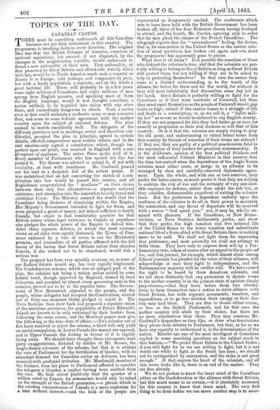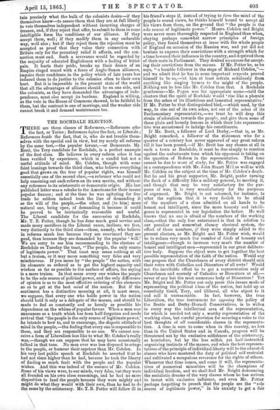TOPICS OF THE DAY.
CANADIAN CLOUDS. THERE must be something underneath all this Canadian business not yet fully understood in this country. The programme is breaking down in every direction. The original idea was that the British Colonies of America, conscious of national aspirations, but amazed, if not disgusted, by the changes in the neighbouring republic, would endeavour to found a new nationality of their own. That nationality, at first protected by Great Britain and afterwards strictly allied with her, would be to North America much such a country as Russia is to Europe, cold perhaps, and comparatively poor, but with a hardy population, a separate, and on the whole a great national life. There will probably be in a few years some eight millions of Canadians, and eight millions of men sprung from English parents, and speaking most of them the English language, would it was thought constitute a nation unlikely to be beguiled into union with any other State, and exceedingly dangerous to attack. Such a nation even at first could maintain a moderate army or man a reserve fleet, and come to some definite agreement with the mother country upon the subject of external defence. The plan seemed to march excellently well. The delegates of the different provinces met in meetings, secret and therefore con- fidential, accepted the plan in principle, agreed to certain details, effected compromises upon certain others, and in the end unanimously signed a constitution which, though im- perfect upon one point, was received in England with a sort of rapture of applause. The entire Press spoke well of it. Every member of Parliament who has opened his lips has praised it. The Queen was advised to accept it, if not with cordiality, at least with heartiness. Mr. Card well poured out his soul in a despatch full of the softest praise. It was understood that an Act converting the sketch of a con- stitution into law would be passed this session, and all Englishmen congratulated the ' Acadian" on their choice between their only two alternatives—a separate national existence, and absorption into the somewhat heavily taxed and ambitious Union. The Ministry assured the world that the Canadians being desirous of remaining within the Empire, Her Majesty's Government intended to fight for them, and even proposed a grant of money, not indeed sufficient to fortify Canada, but ample to find comfortable quarters for that British sentry whose legal existence in Canada or anywhere else pledges the whole power of the Empire to defend him. After three separate debates, in which the most extreme views on all sides were openly discussed, the House of Com- mons endorsed by a vote of seven to one the Ministerial promise, and journalists of all parties affirmed with the full assent of the nation that Great Britain rather than abandon Canada, if she wished not to be abandoned, would risk a serious war.
The prospect has been very speedily overcast, or, as some of our Radical friends would say, has very rapidly brightened. The Confederation scheme, which was an integral part of the plan, the colonies not being a nation unless united by some federal bond, though approved by England, framed by local delegates, and accepted by almost every governing man in the colonies, proved not to be to the popular taste. The Govern- ment of New Brunswick appealed to the people, and the people, whose delegates had accepted the Constitution, elected out of forty-one members thirty pledged to reject it. The Nova Scotian then drew back and proposed a separate union of the maritime provinces, the population of Prince Edward's Island are known to be only restrained by their leaders from following the same course, and the Montreal papers now give the following as the true state of affairs :—Two colonies out of five have resolved to reject the scheme, a third will only yield on social compulsion, in Lower Canada the masses are opposed, and in Upper Canada the feeling in favour of it is rapidly dying away. We should have thought these statements were party exaggerations, dictated by dislike of Mr. Brown, the Anglo-Saxon advocate of the scheme, but that it is evident the vote of Parliament for the fortification of Quebec, with its attendant demand for Canadian outlay on defences, has been received with profound irritation. Mr. Macdonald, member of the Cabinet, from his place in Parliament affected to consider the telegram a blunder, a cypher having been omitted from the vote. Mr. Galt stated positively that the quarter of a million voted by Canada for armaments would only be raised on the strength of the British guarantee,—a phrase which in the existing circumstances of Canada is a mere euphuism for a loan without interest,—and the bulk of the people are Irepresented as dangerously excited. The conference which was to have been held with the British Government has been broken off, three of the four Ministers chosen having declined. to attend, and the fourth, Mr. Cartier, agreeing only in order that he may plead the claims of the French Canadians. The telegraph reports that the " annexationist" feeling, the desire, that is, for annexation to the United States as the easiest solu- tion of many questions, has broken out again and—in short the programme has apparently gone to pieces.
What does it all mean ? Is it possible the assertion of those who distrust the colonies is true, and that the colonists are per- fectly willing to belong to Great Britain as long as Great Britain will protect them, but not willing if they are to be asked to help in protecting themselves ? In that case the sooner they come to a distinct understanding as to the worth of the alliance the better for them and for the world, for without it. they will most indubitably find themselves some day left in the lurch. Great Britain is perfectly willing to fight for the Canadians as if they were residents of Cornwall, but then they must exert themselves as the people of Cornwall would, pay taxes as high, submit if the matter comes to a struggle of life and death to a conscription, or, as we call it, a "ballot mili- tia law" as severe as would be enforced in any English county. If they are not prepared for this they had better go at once, for exactly in proportion as their zeal slackens so will that of this country. Or is it that the colonies are simply trying to play the old game, and endeavouring to extort better terms from this country by threats of secession if their terms are refused ? If they are, they are guilty of a political anachronism fatal to the reputation of their leaders for practical statesmanship. It. is the deliberate opinion of the best political thinkers and the most influential Cabinet Ministers in this country that the time has arrived when the dependence of the Anglo Saxom colonies must either cease, or merge in an alliance to be arranged by clear and carefully-observed diplomatic agree- ment. Upon the whole, and with one or two reserves, they prefer the latter course, so much prefer it that they are willing to undergo the risk of war and the certainty of very consider- able expenses for defence, rather than adopt the safe but, as they consider, dishonourable expedient of cutting the colonies loose. But the preference is dependent entirely upon the readiness of the colonies to do all in their power to maintain the connection, and any threat of departure will be received with a serene " God speed you," not, it may be, wholly un- mixed with pleasure. If the Canadians, or New Bruns- wickers, or Nova Scotians deliberately prefer, and show that they prefer, the high taxation and free national life of the United States to the lower taxation and subordinate national life of a State allied with Great Britain there is nothing more to be said. We shall not fight them for expressing that preference, and most assuredly we shall not attempt to bribe them. They have only to express their will by a Par- liamentary vote, taken of course after an appeal to the people ad hoc, and this journal, for example, which almost alone among Liberal journals has pleaded for the value of their alliance, will acknowledge at once their right to independence, and the Parliamentary majority will be swifter still. We have earned. the right to be heard by these American colonists, and we tell them distinctly that any pretension to dictate terms to the mother country is in the present state of opinion simply preposterous,—that they have before them two alterna- tives, to form themselves into a nation in strict alliance with Great Britain, but with separate armaments, taxation, and expenditure, or to go free whither their energy or their des- tiny may lead them. They are free to choose either course, as free as the British Parliament, and for this once the mother country will abide by their choice, but there are. no more alternatives than these. They may construe Mr. Cardwell's despatches as they like, or draw what conclusions they please from debates in Parliament, but that, so far as we have any capacity to understand it, is the determination of the nation. Months ago one of the most intelligent of Canadians. replied to some searching questions on the subject much in this fashion,—" We prefer Great 'Britain to the United States ; if you will fight for us we are willing to fight, but it is not worth our while to fight as the South has done ; we should not be extinguished by annexation, and the stake is not great enough." If that express the heart of the colonists, and all this news looks like it, there is an end of the matter. They are free already.
We do not profess to know the inner mind of the Canadians either on the Confederation or the alliance with Great Britain, but this much seems to us certain,—it is absolutely necessary for this country to know that inner mind. The very first thing to be done before we can move another step is to ascer- fain precisely what the bulk of the colonists desire—if they themselves know—to assure them that they are at full liberty to vote themselves independent without incurring charges of treason, and, if they reject that offer, to submit to them in seine intelligible form the conditions of our alliance. If they accept them, well ; if they modify them in any endurable way, well also ; but if they reject them the rejection must be accepted as proof that they value their connection with Britain only for the pecuniary relief it affords, and the con- nection must end. Such a severance would be regarded by the majority of educated Englishmen with a feeling of bitter pain. It hurts their pride, breaks up their dream of an Empire ringed round with a fence of Anglo-Saxon alliances, impairs their confidence in the policy which of late years has induced them to do justice to the colonies often to their own hurt. But it is impossible in the present state of the world that all the advantages of alliance should be on one side, and the colonists, as they have demanded the advantages of inde- pendence, must also accept its burdens. England is willing, as the vote in the House of Commons showed, to be faithful to them, but the contract is one of marriage, and the weaker side cannot break it and demand maintenance too.































 Previous page
Previous page